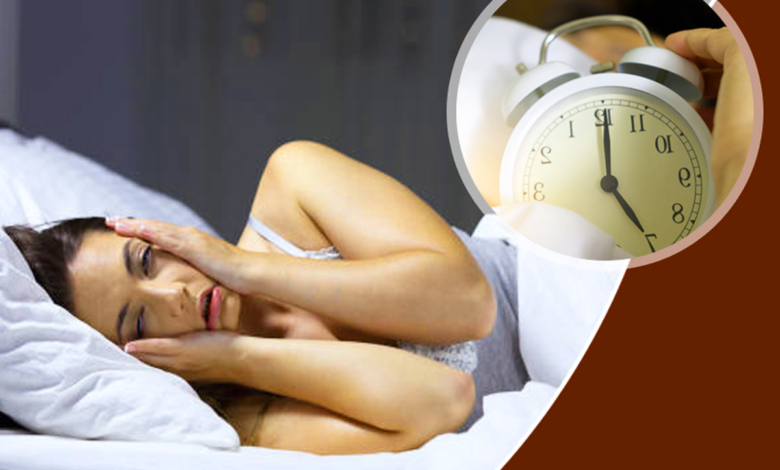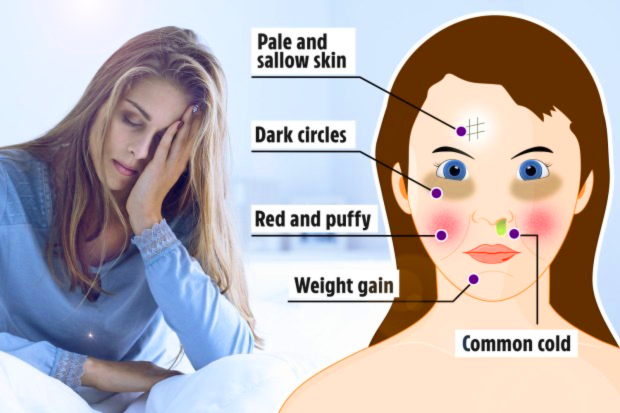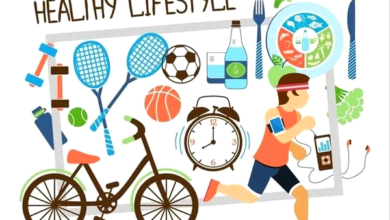How Sleep Deprivation Affects Your Health

One-third of American adults suffer from sleep deprivation , which is defined as having fewer than seven hours of uninterrupted sleep per night. And an even greater number of adolescents suffer from sleep deprivation. According to the Centers for Disease Control and Prevention, more than 57% of middle schoolers and 72% of high schoolers experience sleep deprivation on school nights.
Insufficient sleep can result in both immediate and long-term health repercussions, as stated by the National Institutes of Health. Sleep deprivation can impair social functioning, transportation, work, and academic performance. Additionally, learning, concentration, and reaction time may be impaired. Additionally, it has the potential to induce emotions such as exasperation, irritability, or anxiety, and may even result in enduring physical harm. Furthermore, sleep deprivation is a worsening issue, according to research.
What Is Sleep Deprivation?
As defined by the National Sleep Foundation, sleep deprivation is the inability to obtain the advised amount of sleep (Janet Hilbert, M.D.), a sleep specialist affiliated with Yale Medicine in New Haven, Connecticut. How much sleep an individual requires varies with age.
Total and partial sleep deprivation are the two forms of sleep deprivation. Acute total sleep deprivation, according to Dr. Hilbert, is the temporary absence of sleep altogether, such as when an individual works through the night in order to complete a task. Chronic partial sleep deprivation, which occurs when an individual consistently gets less sleep than is required for optimal performance, is more prevalent. An illustration could be a weeknight sleep duration of five hours, when the established guideline for adults is seven to nine hours per night.
Read More : Foods That Help Fight Fatigue
In contrast to scientific findings, the majority of sleep deprivation is only partial in nature. “Individuals can only endure brief periods without sleep before developing an intense need to sleep.” Says Dr. Hilbert.
Sleep deprivation research involves the utilization of subjects in various experimental conditions. On occasion, research participants are confined to a laboratory for several days without the ability to slumber; this is known as acute total Insufficient Sleep . In certain instances, research participants may be permitted to sleep for brief durations on each study night in order to extend the duration of the research (this is known as protracted partial sleep deprivation).
Nevertheless, time is merely one of several variables that can influence sleep deprivation. Darren P. Mareiniss, M.D., an assistant professor of emergency medicine at Sidney Kimmel Medical College, Thomas Jefferson University in Philadelphia, Pennsylvania, adds that sleep quality is an additional factor. An individual can still suffer from sleep deprivation despite receiving the recommended amount of hours if, for instance, they experience frequent arousals or decreased REM sleep.
Causes Of Sleep Deprivation
Causes of sleep deprivation are varied.
Chronic Difficulty Falling or Staying Asleep

Although insomnia can be experienced by anyone at times, chronic sleep deprivation can be caused by specific factors, according to Dr. Hilbert. These encompass sleep disorders that affect the circadian rhythm, including insomnia, sleep apnea, restless legs syndrome, and others. Insufficient Sleep can be exacerbated by medical conditions such as symptomatic congestive heart failure, poorly managed asthma, anxiety, and melancholy. Additionally, specific medications and substances, such as stimulants, alcohol, steroid use, and caffeine, can have an adverse effect on sleep.
Shift Worker Syndrome
As per Dr. Mareiniss, shift worker syndrome, an ailment caused by the disruption of the body’s typical circadian rhythm between night and day, may have adverse effects on both the quality and quantity of sleep. “Shift worker syndrome [circadian rhythm disorder] patients sleep during the day and are at work at night,” he explains. Such an occurrence interferes with the body’s typical arousal cycle and may lead to Insufficient Sleep . The disturbance may prevent patients from sleeping at night, resulting in sleep deprivation.
Lack of Opportunity or Time to Sleep
Sleep deprivation is frequently caused by a lack of sleep opportunities or “insufficient time allotted for sleep,” according to Dr. Hilbert. Managing an infant or young children, in addition to a demanding work or school schedule, may contribute to this.
Lack of Sleep Awareness
Some individuals fail to achieve sufficient sleep because it is not a priority, according to Dr. Hilbert. This may occur due to a lack of consideration for sleep or maladaptive behaviors that restrict sleep. Illustrative instances include variable sleep scheduling, characterized by a sporadic sleep-wake cycle.
An illustration of variable sleep scheduling could be a person whose work schedule dictates he sleeps from 10 p.m. to 6 a.m. during the week, but from 1 a.m. to 9 a.m. on Friday and Saturday evenings, according to Dr. Hilbert.
“When he attempts to go to bed at 10 p.m. on Sundays, he is not prepared to do so, and he still has to wake up at 6 a.m., so he begins the week with less sleep than he requires,” she explains. “A three-hour time difference between weekday and weekend sleep schedules is equivalent to embarking on a weekly round-trip flight from New York to California.”
Symptoms Of Sleep Deprivation
Symptoms related to sleep deprivation include the following:
Memory Impairment
Extensive research has established a correlation between sleep deprivation and memory impairment. According to a 2018 study published in the Journal of Experimental Psychology, Insufficient Sleep impairs memory.
Impaired Academic or Work Performance
Dr. Mareiniss observes that sleep deprivation frequently disrupts academic or occupational performance by causing diminished responsiveness to stimuli, cognitive agility, and alertness. “Tasks requiring more advanced cognitive abilities might be impacted.” “There is a possibility that individuals will commit more errors and deliver subpar work performance,” he warns. The correlation between Insufficient Sleep and academic achievement is substantiated by a wealth of research; thus, an increasing number of school districts are implementing later start times.
Increased Mental Health Symptoms
Additionally, sleep loss can impact temperament and mental health. Dr. Mareiniss states, “Sleep deprivation may lead to anxiety, depression, irritability, a diminished libido, and moodiness.”
Decreased Judgement
Insomnia has the potential to induce impulsive behavior. “Chronically deprived individuals may exhibit heightened anxiety, impatience, and a propensity for erroneous decision-making,” explains Dr. Mareiniss.
Daytime Drowsiness and Microsleep Episodes
Dr. Mareiniss explains that sleep deprivation can lead to daytime lethargy and microsleeps, which are extremely brief periods of sleep that may go unnoticed. “When not physically active, sleep-deprived individuals may experience periods of microsleep,” he explains. It is especially hazardous when a driver who is sleep-deprived is involved.
Health Effects Of Sleep Deprivation
Long and short-term negative health consequences can result from sleep deprivation.
Reduced Immunity
The detrimental effects of sleep deprivation on immunity have been substantiated by numerous scientific investigations. “As sleep deprivation increased, healthy adults who were inoculated with a cold virus for a research study were more likely to develop cold symptoms,” Dr. Hilbert says, citing a 2010 study published in the Archives of Internal Medicine.
Abnormal Metabolism
A sleep deprivation can also impact the metabolism. “Healthy adults who experienced chronic partial sleep deprivation for less than one week developed abnormal glucose tolerance and insulin resistance,” according to Dr. Hilbert, citing research published in Current Diabetes Reports in 2014 .
The appetite and satiety-regulating hormones leptin and ghrelin were altered in sleep-deprived subjects, resulting in cravings for sweet, salty, and starchy foods. This metabolic dysregulation may result in weight gain, obesity, and type 2 diabetes, according to the study.
Increased Incidence of Serious Health Complications and Disease
Additionally, there is evidence linking sleep deprivation to mortality and life-threatening health conditions. Dr. Hilbert states, “Epidemiological [population] research has identified associations between insufficient sleep and mortality, hypertension, stroke, diabetes, obesity, and cancer, particularly in the context of sleep apnea.”
Increased Risk of Accidents and Early Death
Prof. Mareiniss explains that chronic sleep deprivation not only has neurocognitive consequences such as diminished vigilance and responsiveness, but also elevates the likelihood of accidents and premature mortality. People who slept less than seven hours in the previous twenty-four hours were more likely to be involved in a car accident than those who had adhered to the recommended sleep duration, according to a 2018 study published in SLEEP. Conversely, those who received less than four hours were fifteen times more likely to be involved in an accident.
Growth and Development
One factor contributing to the increased sleep demands of infants, children, and adolescents in comparison to adults is the interrelation between sleep and development. According to the National Heart, Lung, and Blood Institute, deep sleep stimulates the body to release the hormone that aids in the repair of cells and tissues, promotes healthy growth in children and adolescents, and improves muscle mass in adults.
Treatments For Sleep Deprivation
There are numerous treatment options for sleep deprivation. Consult your physician regarding your particular circumstances in order to ascertain the most optimal course of action.
Allowing for More Sleep Opportunity
As inadequate sleep opportunities hinder the ability of many individuals to obtain sufficient rest, Dr. Hilbert suggests that implementing targeted adjustments to schedules or institutional/public policies may prove beneficial. “Random rotating schedules in shift work, for instance, generally lead to greater sleep deprivation than fixed schedules or schedules in which the rotation is gradually deferred.” “Delaying school starts results in increased sleep duration and improved academic performance among high school students,” she explains.
Read More : Top 10 Tips for Healthy Winter Skin
Treating Specific Sleep or Medical Disorders
Sleep deprivation caused by sleep disorders or other underlying medical conditions can be significantly alleviated through the treatment of the underlying cause. “To maintain a stable airway in patients with sleep apnea, this may involve continuous positive airway pressure therapy or an oral appliance.” “This may be cognitive behavioral therapy for chronic insomnia,” explains Dr. Hilbert.
Medical disorders may potentially exhibit enhanced symptom management capabilities. Alternatively, this may involve a “careful review of prescribed and over-the-counter medications and substances, with the elimination or reduction of those that interfere with sleep,” as stated by Dr. Hilbert in regards to medication or substance issues.











